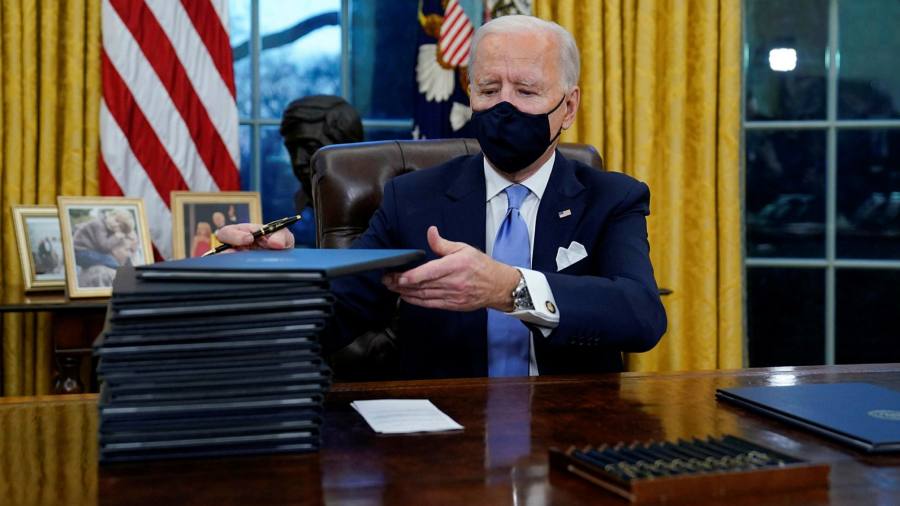[ad_1]
Much mischief has been made about Joe Biden dragging his feet before telephoning Israel’s Benjamin Netanyahu, a ritual early gesture for all US presidents as they reaffirm national ties. Israel’s premier was extravagantly indulged by Donald Trump, whose Middle East policies almost ticked off the wishlist of the Israeli right.
Even under Barack Obama, Biden’s former boss, Netanyahu was so confident of his standing in Washington that he felt able to call on the US Congress to repudiate the 2015 nuclear accord with Iran, the Obama administration’s signature diplomatic achievement. Congress resisted but Trump did so in 2018 — and now Biden is trying to retrieve the deal.
Netanyahu is facing re-election yet again, this time while fighting corruption charges in court. Last year his campaign featured giant banners of him alongside Trump — an image dropped from his Twitter account only last month. While Biden’s pro-Israel credentials are impeccable, he does appear to be sending a message. Israeli voters have been sensitive in the past to their leaders getting on the wrong side of the US — a factor in Netanyahu’s defeat in 1999, after the first of his record five terms.
The call will inevitably come, but the Biden White House seems to be using silence as part of its reappraisal of relations with the Middle East, aimed especially at unruly and autocratic allies. Not talking is an unorthodox tool of diplomacy but may have some uses.
At the time of writing, Biden had yet to call Mohammed bin Salman, crown prince and day-to-day ruler of Saudi Arabia, a US ally of 75 years. Recep Tayyip Erdogan, president of Nato ally Turkey, had also not been telephoned. Nor had President Abdel Fattah al-Sisi of Egypt, a country long at the centre of US policy in the region.
Trump’s unscripted and transactional conversations with these leaders could have alarming and unpredictable outcomes. The partial withdrawal of US troops from northern Syria in October 2019 and Turkey’s incursion into the area followed an off-piste phone call with Erdogan. After Trump’s conversations with their leaders at a summit in Riyadh in May 2017, Saudi Arabia, the United Arab Emirates and Egypt blockaded Qatar, a move Trump initially backed, even though the maverick Gulf emirate hosts the biggest US air base in the region.
It might be argued that the Biden silent treatment, on top of concrete measures such as the suspension of arms deals with Saudi Arabia and the UAE, is a welcome prompt of more cautious behaviour.
Last month, the blockade of Qatar was finally lifted, in what looked to be a carefully prepared offering to team Biden. The Saudis also cut oil production, in a move helpful to US shale oil companies. Last week, they released activist Loujain al-Hathloul, who had been imprisoned and abused for her campaign for women’s right to drive.
Erdogan, in anticipation of the change in Washington, and after a spree of regional adventurism, has also been showing his more pragmatic side. Turkey last month held its first direct talks with Greece in five years, in an attempt to head off the gathering confrontation in the eastern Mediterranean over maritime borders and gas riches. Ankara, a lead actor in Libya’s civil war, has cautiously backed the surprise emergence of a UN-brokered interim government to reunite the country.
One of the many problems Ankara has with Washington and its other Nato allies is its purchase of Russian S-400 air defence systems. Even on this touchstone issue Turkey is signalling a willingness to compromise.
This outbreak of reasonableness could be little more than precautionary atmospherics. The Biden team has said there will no more blank cheques for autocrats — including a reference to Trump’s “favourite dictator†Sisi. Biden has promised a review of relations with Saudi Arabia, given a free pass by Trump even after the CIA implicated Prince Mohammed in the murder of journalist Jamal Khashoggi at the kingdom’s consulate in Istanbul in 2018. The shield Trump often provided for Erdogan in Washington is likely to be removed.
Yet doubts abound across the Middle East about the extent to which this US administration would really risk its traditional alliances in the region. From the disastrous fallout of the Iraq war and occupation under George W Bush, to the hesitant muddle over intervening in Syria under Obama — all preceding the erratic and wilful policies of Trump — American influence has receded.
The US has gradually created a regional vacuum that has been partially if chaotically filled by Russia, Iran, Turkey, Saudi Arabia and the UAE. In that light, it will be hard for Biden to turn this early exchange of signals into a substantive reset.
[ad_2]
Source link






